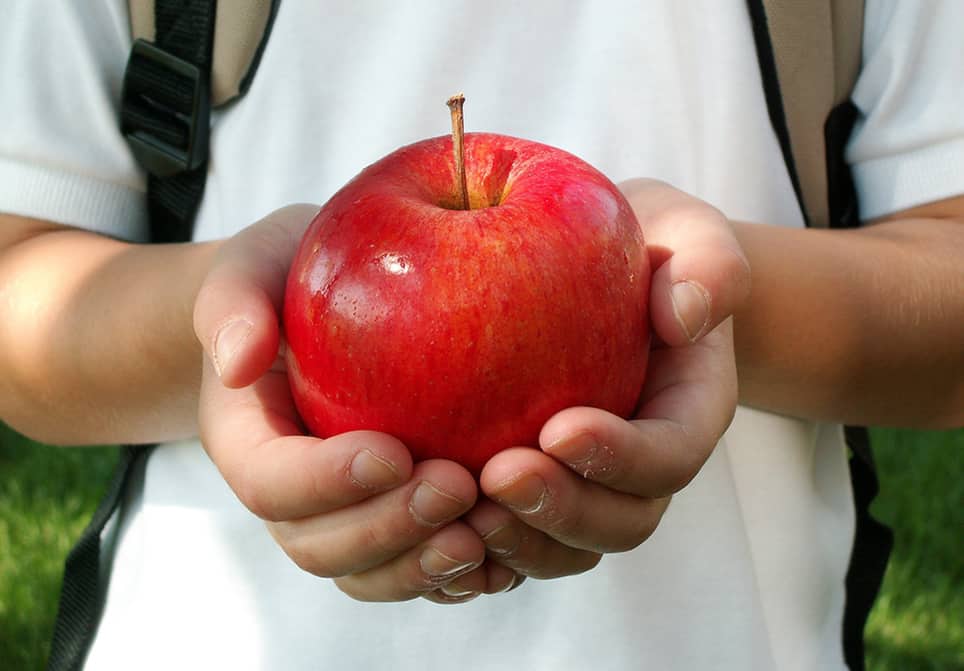A Unique Thanksgiving Season: Even More Reasons to Be Grateful for Our Teachers

As we turn the calendar to November—the season of giving thanks—it is important to reflect on the past many months. We all are feeling overwhelmed and exhausted by the strains of the pandemic and its impacts. Though it is natural to focus on these challenges and the uncertainty we have all faced, we must also pause to honor the remarkable individuals who have gone above and beyond to sustain some levels of continuity and support in our lives despite incredible disruptions in their own.
Our educators have continuously provided structure, care, and encouragement for students and their families. They have been the thread connecting transitions from in-person to virtual to hybrid learning. They have partnered academic lessons with social emotional support and conversations to help students prepare for and respond to the challenging circumstances. They have reinvented their approaches to ensure high quality instruction—in their classroom with physical distancing and masks, virtually for students at home, and combinations of both. And they have been ready, at a moment’s notice, to shift to a different model, without disrupting learning, growth, student well-being, or classroom community. Teachers have formed strong relationships and bonds with their students even though many have never met them in person. They have supported parents by regularly communicating and answering a myriad of questions to calm worries about this school year. These feats are a testament to our teachers’ incredible humanity and professionalism.
With so much going on in all of our lives, It is easy to forget to pause and share thanks for this important work. But, as we approach the season of Thanksgiving, those of us who surround and depend on teachers—from parents of students to school administrators—must note, acknowledge, and convey thanks for all our teachers have done and continue to do for our children, families, and communities.
Give Thanks
With physical distancing measures and changes to the school routines and structures, teachers have lost so many of the informal interactions with families where parents share a warm smile to say thank you or a quick conversation to share their gratitude. And administrators are often so busy with planning, fielding questions, and handling operational issues, their interactions with teachers have been constrained. With all of this, there are fewer opportunities for us to acknowledge the work of teachers; but, given the incredibly challenging context of this school year, teachers need positive feedback more than ever.
Administrators: When you see your teachers showing up with enthusiasm, problem-solving around the unique circumstances of teaching in a pandemic, or being creative and resourceful in supporting their students and families, pause to share your gratitude. When you hear a kind message about a teacher, pass it on. Celebrating and valuing the efforts of teachers boosts the morale of your staff and broader school community.
Parents: If your child’s teacher goes above and beyond, let someone know. Tell your friends or reach out to the school’s principal to highlight this good work. It is amazing how a few positive anecdotes can raise morale among school communities. We must honor our teachers and the meaningful work that they do. Write a quick note or email or invite your kids to write or draw a note of thanks in order to connect with a teacher and show your appreciation for their work. More than ever, teachers are inundated with emails and text messages that add to their to-do list. A simple note sharing a quick moment of gratitude can serve as a reminder to our teachers that they are noticed, appreciated, and respected.
Have Grace
In this unprecedented year of teaching and learning, we must all set our expectations appropriately. We must keep our perspectives in check by looking for evidence of growth rather than a sole focus on outcomes. And we must celebrate the small victories. The quantities of what we need to think about and worry about on an hourly, daily, weekly, and monthly basis are incredible and seem to continue to grow. The circumstances of the pandemic continue to take an emotional, physical, and mental toll on everyone. We are operating within an entirely new model for teaching and learning, making even seemingly simple tasks feel quite complicated.
Administrators: Take time to check in on your teachers. Prioritize their personal well-being and efforts over benchmarks or anachronistic, pre-pandemic evaluations. And when something does not go to plan, lead with empathy and understanding and offer support and encouragement. Take care not to compare 2020 to any previous year of teaching and learning.
Parents: When a video conference starts late because of a technical glitch or an email is sent with an incorrect date, we must offer grace. Let us also be grateful when our teachers show us that same grace when our children show up in their pajamas or cannot find a comfortable way to sit and listen. This reciprocity of compassion will strengthen bonds between home and school as we honor one another’s efforts.
Offer Support and Assistance
We must transform this good will and appreciation into action by finding ways to support our educators in this unique year of learning. With so many school systems transitioning between different learning models and environments, teachers are still figuring out what supplies, professional learning, tools, and support they need. Families and administrators alike should do regular check-ins to assess needs and find ways to fill any gaps.
Administrators: School leaders can work to lighten the load for teachers. Find ways to remove nonessential work from teachers’ to-do lists. Create ways to share work among teaching teams and encourage specialists and support staff to partner with classroom teachers. Protect your teachers from a deluge of questions and concerns by proactively communicating with families and the greater community. In those communications, be sure to share glimpses into the tremendous thought and care that teachers are putting into their planning. Create space and safe opportunities for teachers to share their struggles and challenges. Listen to and trust teachers’ thoughts and requests for what is needed to ease their burdens or to improve teaching and learning.
Parents: Many schools and teachers are hesitant to ask families for contributions because of the financial impact of the pandemic. If you are able to help, send a note offering your willingness to send in supplies or inquire about other ways you can support the classroom community. Given the restrictions on sharing supplies among students and the emphasis on regular cleaning, teachers may be in need of additional manipulatives and disinfecting sprays and wipes. Taking these items off a teacher’s to do list allows them to focus on more meaningful and substantive efforts.
Beyond Thanksgiving
Teachers have always performed countless duties and roles well beyond their job description. The scope of their work has rarely been limited to the school hours or the school calendar. Teachers pay is in no way commensurate with the thought and care they put into planning and preparing, nor the impact they have on students. Teachers have long been heroes of individual success stories and collective progress and well-being.
During this unprecedented time of public health uncertainty, financial challenge, and incredible disruption to daily lives, our teachers have somehow further expanded their role and increased their contributions to students, families, and communities. Overnight, they have become expert curriculum designers, instructional coaches to parents, technical support hotlines, and so much more. And at any given moment, they are ready to pivot between these roles—modeling calm flexibility, unwavering patience, and courageous resiliency—without disrupting the learning and growth of their students.
This Thanksgiving season, teachers should undoubtedly be at the top of our lists of those for whom we are grateful. Our school and broader communities should fill their inboxes, computer screens, and days with words and actions of appreciation, grace, or support to convey that their work is valued and appreciated. And as we put away the turkey trimmings and leftovers, let us not let these demonstrations of appreciation wane. Our teachers continue to ensure nurturing and productive learning experiences for all students with consistency all year long regardless of circumstance; we owe it to them to regularly acknowledge this work and say thank you.
For more, see:
- The Getting Smart Team Gives Thanks
- 20 Reasons to Give Thanks for Teachers
- Let us Give Thanks for the All-Too-Often Thankless Jobs
Stay in-the-know with innovations in learning by signing up for the weekly Smart Update.





0 Comments
Leave a Comment
Your email address will not be published. All fields are required.